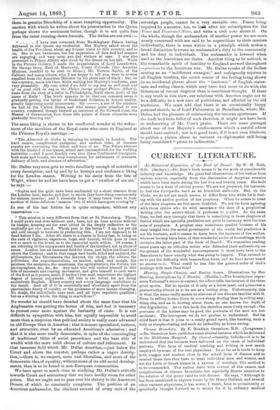CURRENT LITERATURE.
An Historical Exposition of the Book of Daniel. By W. H. Rule, D.D. (Soeleys.)—Dr. Rule's book seems to be the work of considerable industry and knowledge. He gives full illustrations of his author from various sources, especially from the discoveries of Assyrian remains which have been made during the last five and twenty years. His fault seems to be a want of critical power. We are not prepared, for instance,
to find the Cyropndia used as an historical authority. But, on the whole, we do not see much reason to differ from him while he is deal- ing with the earlier portion of the prophecy. When ho comes to treat of the later chapters we feel more doubtful. We are far from agreeing with those critics who fix with assurance the date of a prophetical writing after the events which it professes to predict. At the same time, we feel very strongly that there is something in those chapters of Daniel which are specially predictive not quite in harmony with the true note of prophecy. A prophet may sometimes predict because of his deep insight into the moral government of the world, but prediction is not his business, and it seems to have been the business of the author, whoever he may have been, of that wonderful series of foretelling. which occupies the latter part of the book of Daniel. We remember reading some years ago an orthodox writer who defended their authenticity on the ground of the wonderful encouragement it must have been to the Maccabees to know exactly what was uoing to happen. That seemed to us to put the difficulty with tremendous force, and we have never heard an answer to it. What could be less like the general order of God's dealings with men than this ?






























 Previous page
Previous page